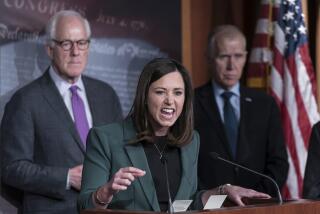The Senate curse
LAST MONTH, as Congress rushed to quit for the year, members of the Senate faced a dilemma. A must-pass bill to fund the Iraq war was steaming toward final passage. Attached to it was an amendment to permit oil drilling in the Arctic National Wildlife Refuge.
What to do? A vote against the legislation might be seen as a wartime abandonment of U.S. troops, while a vote for the bill could be cast by environmentalists as a license to despoil one of the few pristine spots left on Earth.
Senators undid the knot by waging a bipartisan filibuster that separated the Alaska drilling amendment from the defense spending bill, allowing passage.
But the dicey debate helps explain one of the striking facts of American politics: The Senate is an inviting but awful place from which to launch a run for president. With hundreds, even thousands, of bills to navigate over a career, there is danger in every ambiguous vote, like the one pitting insurgent hordes against caribou herds.
As political handicapper Charlie Cook put it, “A career in the Senate is like a paper trail of little time bombs ready to blow up.”
Indeed, in the history of the republic, just two senators have gone directly from the Senate to the White House. John F. Kennedy was one. The other was Warren G. Harding. Fourteen men have served in the Senate and, after intermediate stops, gone on to be president, many ascending from the vice presidency. This discouraging history is one reason some partisans (notably those close to ambitious governors such as New Mexico Democrat Bill Richardson and Massachusetts Republican Mitt Romney) suggest the parties should look outside the Beltway for their next nominees.
But hope and desire being what they are, there is no shortage of presidential candidates among the 100 members of the Senate. Already at this early stage of the 2008 campaign, nearly a dozen are either running, thinking of running or doing little to discourage talk they might run for president. Nine others already have attempted the move up. There is no official accounting of how many senators have believed they should be president, but the number is thought to be in the thousands.
“When you’re dealing with the nation’s issues at the very highest level, I think it’s probably human nature for anyone to want to take the next step,” said Betty Koed, the assistant Senate historian.
But winning the White House means defying not just precedent but also a strong preference that Americans seem to have for a chief executive with at least some executive experience.
One of the things that makes it easier for senators to run for president than, say, a governor is the perception, fair or not, that most senators don’t really do anything. As one of 100 lawmakers, nobody really misses them when they camp out in early voting states such as Iowa or New Hampshire, except on the rare occasion when they are needed on Capitol Hill for a close vote.
Most senators “are perfectly willing to take responsibility to get reelected,” said Charles O. Jones, a presidential expert at the University of Wisconsin. “But they’ve never been in charge” the way a governor is accountable for a state’s budget, its programs, bureaucracy and even, in clemency cases, matters of life and death.
As a result, most senators have little they can point to in the way of tangible achievements — “I supported cloture on the substitute amendment to the reconciliation bill” only has so much resonance on the hustings — and aren’t nearly as well known outside the Beltway as they might think.
“Voters, especially in those early primary and caucus states, are looking for action,” said Scott Reed, a Washington campaign strategist who ran Senate Majority Leader Bob Dole’s 1996 presidential campaign. “Even a guy like Bob Dole, who was a giant in the Senate both in his leadership role and in passing legislation with his name on it, was not that well known.”
For good or ill — and often the latter — many senators have a hard time shedding the upper chamber’s fusty manner, which explains why so many of their presidential stump speeches read like excerpts from the Congressional Record rather than remarks at a coffee klatch in Iowa.
“It’s the nature of senatorial-ese,” said Marshall Wittmann, a Washington savant who has worked for Democratic and Republican causes. “They talk in terms of ‘conferences’ and ‘riders’ and language that most Americans cannot discern.” And then there’s that voting record.
As Norman Ornstein explains: “As a senator, you’re going to cast — if you’re around any length of time — thousands and thousands of votes. You’ll vote for omnibus bills that include 1,000 separate provisions. It may turn out two of those provisions you’re not happy with, but your choices were an up-or-down vote, and you voted up. Opponents can rip you to shreds.”
Or a candidate can self-mutilate, the way Sen. John F. Kerry of Massachusetts did in 2004 when he tried to explain his vote on a military and reconstruction funding bill for Iraq and Afghanistan. “I actually did vote for the $87 billion before I voted against it,” Kerry said, in words that helped cement his image as a congenital flip-flopper.
“If he said it in a Senate caucus, or said it to a group of parliamentarians or legislative scholars, everyone would have understood,” said Ornstein, a scholar with the American Enterprise Institute. “They understand you vote for something in committee, and if it gets to the floor with too many changes, or they take something out, you vote against it.”
Try explaining that in Huntington, W.Va., as Kerry did.
Again, what to do? Senators can downplay their day job. Sens. Evan Bayh, a Democrat from Indiana, and George Allen, a Republican from Virginia, are both expected to run for president in 2008 and emphasize the years they served as governors.
“I do think that executive background makes him different than most senators who might potentially seek the nomination,” said Dick Wadhams, an Allen advisor who noted, for now anyway, that his boss is focused solely on getting reelected to the Senate in November.
Democratic New York Sen. Hillary Rodham Clinton could break new ground in myriad ways, not just as the first woman to seriously vie for a major-party presidential nomination but as the first senator-turned-presidential candidate with an eight-year record as first lady to fall back on. She too “is focused entirely on her reelection” in November, said spokesman Howard Wolfson.
As it happens, the early frontrunners for both party nominations are senators, Clinton for the Democrats and Arizona’s John McCain for the Republicans. In a post-9/11 world, Ornstein suggests, voters might even reassess what they look for in a president. “It’s possible that, maybe driven by events, the idea of whether you’re ready to deal with a world in which evil people are trying to kill us might be a comparable advantage for legislators over governors who don’t have the experience,” Ornstein said. Indeed, Bayh, who sits on the Senate Intelligence and Armed Services committees, likes to jokingly refer to himself as a former governor with national security experience.
Those beribboned credentials certainly didn’t help Kerry. His heroic Vietnam War record and long years in the Senate dealing with international issues proved flimsy armor when President Bush attacked his steadiness and White House allies shredded his credibility with a Swift boat-load of innuendo.
But even that can be explained away by any one of the 100 who believe that they can break the Senate curse, if there is such a thing. Said Ornstein: “It’s very easy to suggest the problems with John Kerry didn’t spring from him being a senator. They sprang from him being John Kerry.”
More to Read
Start your day right
Sign up for Essential California for news, features and recommendations from the L.A. Times and beyond in your inbox six days a week.
You may occasionally receive promotional content from the Los Angeles Times.







